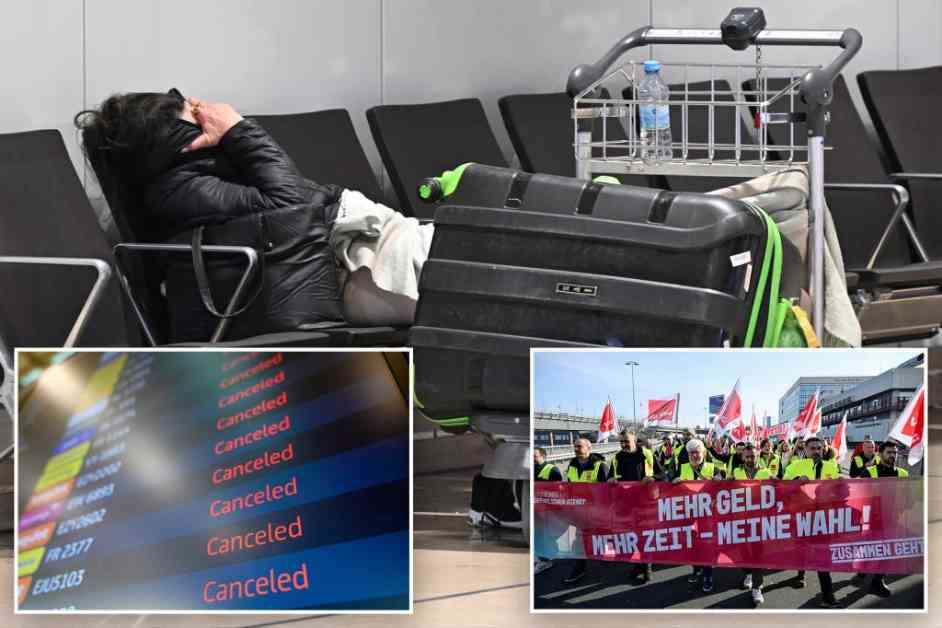Hundreds of travelers are facing chaos and frustration as a 24-hour strike at German airports has led to the cancellation of thousands of flights in a dispute over workers’ pay. The operator of Frankfurt airport, the busiest in Germany, has announced that no passenger flights will be departing from there on Monday, with potential delays and cancellations extending into Tuesday.
The strike, organized by the German trade union Verdi, has impacted 13 airports across the country, including major hubs like Munich, Berlin, and Dusseldorf. Workers at Hamburg airport even brought their strike forward by a day, resulting in nearly 300 flight cancellations on Sunday.
As the strike continues to disrupt air travel, a spokesperson for Fraport revealed that out of the 1,116 incoming and outbound flights scheduled in Frankfurt on Monday, a staggering 1,050 had already been canceled, with that number expected to climb even higher. Passengers are left stranded, frustrated, and unsure of when they will be able to reach their destinations.
Verdi is pushing for an 8% wage increase or a minimum raise of $380 per month, in addition to higher bonuses and more time off. However, employers have deemed these demands unsustainable, setting the stage for a tense negotiation process.
During this turbulent time for the aviation industry, travelers are left grappling with uncertainty, forced to make alternate plans and accommodations as they navigate the fallout of the strike. The impact is not only financial but also emotional, as individuals find themselves caught up in a situation beyond their control.
Expert Insights on the Strike
In the midst of this labor dispute, experts have weighed in on the implications of the strike and the challenges it poses for both workers and passengers. According to labor economist Dr. Maria Schmidt, “Strikes like these highlight the ongoing tensions between labor unions and employers, reflecting broader issues of income inequality and fair compensation in the workforce.”
Dr. Schmidt emphasizes the importance of finding a middle ground that satisfies the needs of both parties, recognizing the vital role that airport workers play in ensuring the smooth operation of air travel. “It’s crucial for negotiations to address the concerns of workers while also considering the financial constraints faced by airport operators and airlines,” she adds.
As negotiations are set to resume later this month, there is a glimmer of hope that a resolution can be reached to end the strike and restore normalcy to air travel in Germany. In the meantime, passengers are urged to stay informed, stay patient, and explore flexible options for their travel plans.
Navigating the Impact on Travelers
For many passengers caught up in the chaos of the strike, the experience has been nothing short of a logistical nightmare. From long wait times and crowded terminals to uncertain rebooking options, the disruption has tested the patience and resilience of travelers.
One such passenger, Sarah Johnson, shared her experience of being stranded at Frankfurt airport amidst the cancellations. “I had been looking forward to this trip for months, and now I’m stuck here with no idea when I’ll be able to leave. It’s frustrating and disheartening,” she laments.
As travelers like Sarah grapple with the uncertainty of their travel plans, airports and airlines are working tirelessly to minimize the impact of the strike and assist passengers in finding alternative arrangements. The human cost of the labor dispute is palpable, underscoring the interconnectedness of the aviation industry and the need for swift resolution.
As negotiations continue behind closed doors, the fate of thousands of passengers hangs in the balance, highlighting the far-reaching consequences of labor disputes in a globalized world. The resilience and adaptability of both workers and travelers are put to the test, underscoring the importance of effective communication, empathy, and collaboration in navigating turbulent times in the airline industry.

